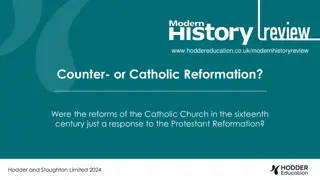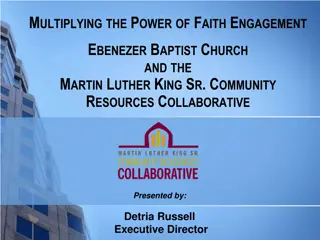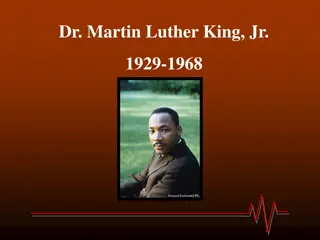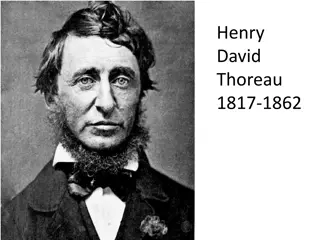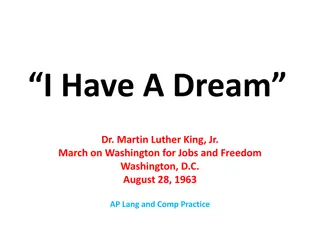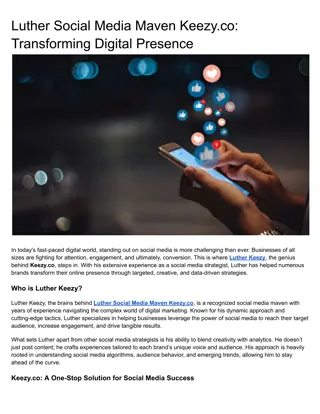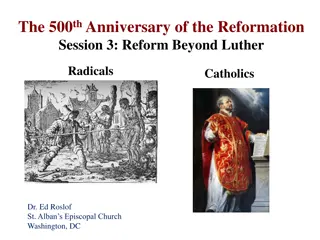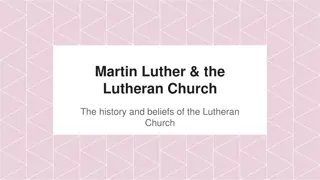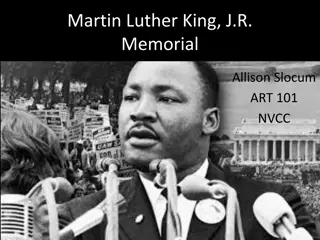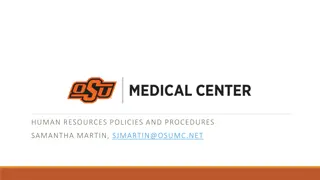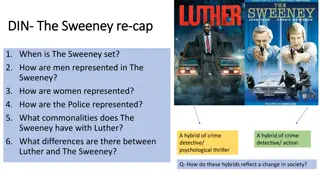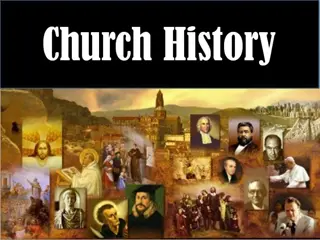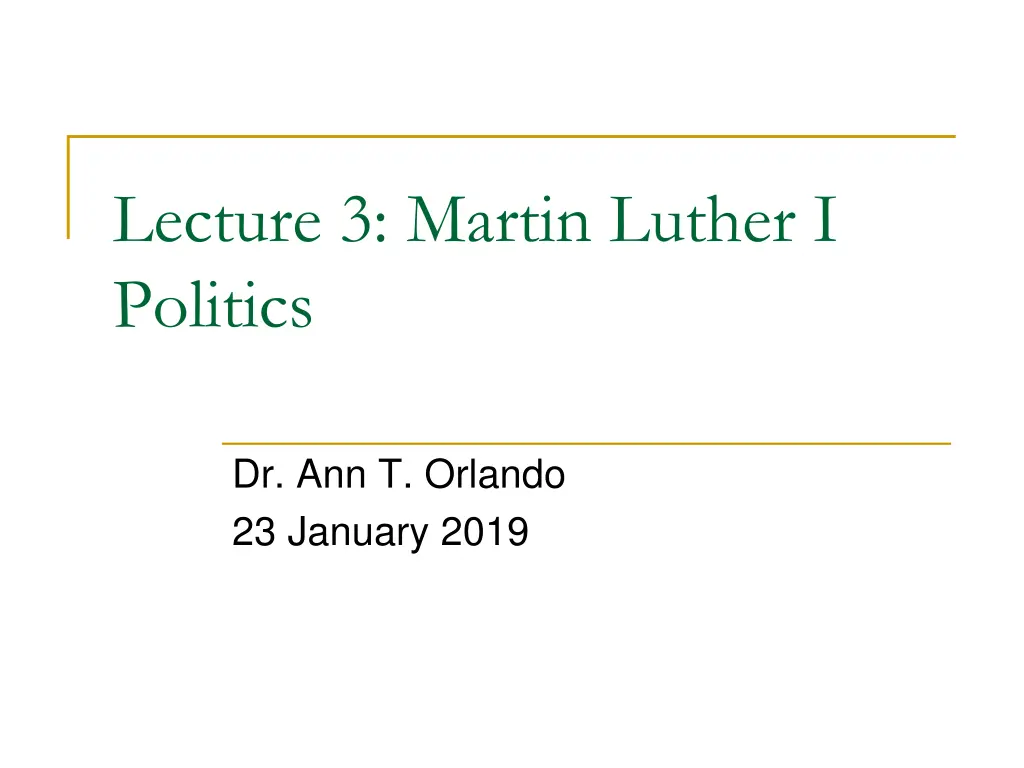
Martin Luther and the Protestant Reformation
Explore the impact of Martin Luther and the Protestant Reformation on politics and society in the 16th century. Discover how Luther's actions led to major religious movements and influenced the political landscape in Europe at that time, amidst conflicts with the Catholic Church and the Holy Roman Empire.
Download Presentation

Please find below an Image/Link to download the presentation.
The content on the website is provided AS IS for your information and personal use only. It may not be sold, licensed, or shared on other websites without obtaining consent from the author. If you encounter any issues during the download, it is possible that the publisher has removed the file from their server.
You are allowed to download the files provided on this website for personal or commercial use, subject to the condition that they are used lawfully. All files are the property of their respective owners.
The content on the website is provided AS IS for your information and personal use only. It may not be sold, licensed, or shared on other websites without obtaining consent from the author.
E N D
Presentation Transcript
Lecture 3: Martin Luther I Politics Dr. Ann T. Orlando 23 January 2019
Major 16thC Protestant (anti-Catholic) Movements Lutheran Reformed (Calvinists, Puritans, Presbyterians, Huguenots) Radical Reformers (Anabaptists, Amish, Baptists, Congregational, Swiss Brethren, Socinians) Anglicans (Episcopalians, Methodists)
Introduction How the Reformation Started...the match that light the bonfire How Europe tore itself apart while Turks under Suleiman the Magnificent are threatening Vienna and Spain, and while Spain and Portugal are exploring the world Sketch of Luther s Life and Works Key Figures in Luther s Life How Luther s Reformation Affected Political Situation Beyond Germany
German Reformation How it started: 1517, Albrecht of Mainz wants to be Archbishop Albrecht buys his archbishopric from Pope Leo X; Rome needs the money in part to help pay for rebuilding of St. Peters (simony) Rome authorizes the preaching of a special indulgence in Germany, with the money to go to Albrecht to repay him for having bought his office (sale of indulgences) Martin Luther Responded to this situation with 95 Theses Went beyond denouncing sin of simony and corruption; fundamentally calls into question Rome s primacy, theology of indulgences; denounces scholasticism German princes, especially Fredrick the Wise of Saxony, support Luther against Rome and against HRE Charles V
Diet of Worms, 1521 Charles V calls the Diet of Worms to examine Luther Charles really wanted a Church Council, but Pope Leo X refused Luther appears before Diet of Worms Luther is condemned by Charles V Luther s Response to Diet of Worms: Since your majesty and your lordships desire a simple reply, I will answer without horns or teeth. Unless I am convinced by Scripture and by plain reason (I do not believe in the authority of either popes or councils by themselves, for it is plain that they have often erred and contradicted each other) in those Scriptures that I have presented, for my conscience is captive to the Word of God, I cannot and I will not recant anything, for to go against conscience is neither right nor safe. Here I stand; I can do no other. God help me. Amen Kidnapped by Fredrick the Wise and taken to Warburg Castle to prevent capture by Charles V
Political/Military Responses Pope Leo X (first estate and a Medici) did not want to cross Fredrick the Wise Check on Charles V power Wanted Germans to take up arms against Turks Peasants revolt (third estate) in Germany in 1525, violently suppressed by Lutherans (second estate) Cognac League formed in 1526 by Pope Clement VII (Medici) and Francois I to oppose Charles V Charles uses Imperial troops, including Lutherans to attack Pope and sack Rome in 1527 Schmalkaldic League formed in 1531 by German nobles opposed to Charles V (frictions within second estate) Sporadic Battles between them and Charles V
16thC political/Military Response (cont.) Peace of Augsburg, 1555 Cuius regio, eius religio, whose reign, his religion Only valid for Lutheran and Catholic princes Answer to who s in charge Thirty Years War, 1618-1648, continued armed struggles in Europe along political and religious lines France (Catholic) and Sweden (Lutheran) against Protestant (and some Catholic) German (Lutheran and Reformed) duchies Peace of Westphalia confirmed Peace of Augsburg, but now included Calvinists (Reformed) Devastating war in central Europe
Sketch of Martin Luthers Life Born 1483 in Eisleben, Germany Attended University at Erfurt On 30 June 1505, caught is a storm and cried to St. Anne to save him with vow to become a monk Enters Augustinian monastery in Erfurt Becomes professor of Biblical studies at Wittenburg University of Wittenburg established by Frederick Wise in 1502 Controversy over Albrecht of Mainz ,1517 Censured by papal bull from Leo X in 1520, Exsurge Domine Summoned before Diet of Worms 1521; kidnapped by Fredrick the Wise, taken to Wartburg Marries Katharina von Bora, 1527 Dies 1546
Map Central Europe 1500 www.metmuseum.org/toah/ht/08/euwc/ht08euwc.htm
Martin Luthers Works Professor of Biblical studies; sermons and commentaries 1513- 1518 Psalms Romans and Galatians Hebrews Reform disputations, after 1517 95 Theses, Babylonian Captivity, Appeal to German Nobility Freedom of the Christian Disputation with Erasmus Table Talk Works against peasants and Jews Translation of Bible into German (begun while in Wartburg) Printing Press allowed Luther s works to be rapidly disseminated throughout Germany and Europe
Martin Luthers Personality Charitably could be called prophetic Uncharitably be called bombastic Direct talk Famous for use of gutter language Unwilling to compromise Not with him, then against him
Lutheran Theologian: Philip Melanchthon (1497-1560) A humanist who studied classical languages very carefully Became a close friend of Luther Wrote the Augsburg Confession (1530) An apology for Reformers given to HRE Charles V Tried to be as conciliatory as possible, emphasizing points of common belief Charles V rejected it
Andreas Karlstadt, Carlstat (1480-1541) Professor with Luther at University of Wittenburg Supported Luther in indulgence controversy Debated Dominican Johan Eck at Leipzig Early leader in radical reformation of liturgy Mass in vernacular No images Eucharist under both species Married clergy Rejects all university degrees Luther sends him to Denmark Karlstatd believed that one could create a Christian society on earth by imposing Christian laws Falling out with Luther; dies in Switzerland
Spread of Luthers Views North Danish King Christian II was in conflict with clergy over control of monasteries and their revenue. He asks Luther to come to Denmark; Luther sends Karlstadt. Encourages married clergy Liturgy in vernacular Priesthood of all believers Christians should follow civil rulers Eventually, King Christian asks Karlstadt to leave; King Christian marries Charles V sister But Denmark remains a Lutheran country
Impact of Reformation Outside of Germany Luther and his protection by German princes opened the flood gates to religious/political turmoil Zwingli in Switzerland Anabaptists elsewhere in Germany Exacerbated political conflicts Between Charles V and Popes (first and second estate) Between Charles V and his electors (within second estate) Between peasants and their dukes/princes/kings
Charles V (1500-1558) Grandson of Ferdinand and Isabella of Spain (mother, Joanna the Mad of Spain) Aunt is Catherine of Aragon, married to Henry VIII Grandson of Maximilian I of Austria (father, Philip I) Became king of Spain (which already included Netherlands, Belgium) and Austria in 1519 Major issues during reign Reformation in Germany Battles with Francois I of France over Italy; Henry VIII allied with Charles V Turks threaten Vienna by land and southern Italy by sea (Francois I allies himself with Turks) And exploring the world Retires to Spanish monastery in 1555, son Philip II assumes monarchy of Spain and Netherlands, brother Ferdinand I assumes control of Austria
Francois I (1494-1547) King of France 1515-1547 Supported French Renaissance (Leonardo Da Vinci) Sent Jacques Cartier to explore Canada Both Francois I and Charles V claim northern Italy Both are at odds with Pope over northern Italy Francois I allies himself with Suleiman the Magnificent (b. 1495; r. 1520-1566) against Charles and HRE Francois also thinks he can take advantage of turmoil in Germany, and perhaps have himself declared HRE Francois tolerant of reformers Charles V defeats Francois I in a series of wars between them
Sack of Rome, 1527 In 1526, Pope Clement VII (Medici), alarmed at the growing strength of Charles V, allies himself with Francois I in Cognac League Charles gathers a mercenary army of Germans and Spaniards; Catholics and Lutherans; to attack Rome Clement VII becomes a virtual prisoner in Castle S. Angelo All of the Pope s troops abandon him except Swiss guard Foreign troops in Rome almost a year; a year filled with plunder Troops finally leave Rome when they are paid off
Impact of Sack of Rome When Henry VIII asks for an annulment from his wife, Catherine of Aragon (Charles V s aunt); in 1533, Pope not anxious to cross Charles again Last Judgment (1535-1541) behind the altar in the Sistine Chapel painted by Michelangelo at request of Pope Paul III in sorrow over sack Compare with Sistine ceiling (1509-1512)
Click to view full-sized image http://faculty.evansville.edu/rl29/art105/img/michelangelo_lastjudge.jpg
Martin Luther on the Strife in the World Disputation with Erasmus of Rotterdam over Free Will Erasmus accuses Luther of unleashing great strife into the world Luther s response: The world and its god cannot and will not bear the word of the true God. And the true God cannot and will not keep silent. Since these two gods are at war with each other, how can there be anything else throughout the whole world, but uproar? Therefore, to wish to silence this turmoil is really to want to hinder the word of God.
From Luther Bible, 1545 Pope as Whore of Babylon
Assignments 1. Archbishop Albert Mainz. The Commission of Indulgences in The European Reformations Sourcebook. ed Carter Lindberg. Malden: Blackwell, 2000. 29-30. 2. Martin Luther. 95 Theses, available at http://www.iclnet.org/pub/resources/text/wittenberg/luther/web/ ninetyfive.html 3. Martin Luther. Appeal to German Nobility and Babylonian Captivity of the Church. in The European Reformations Sourcebook. ed Carter Lindberg. Malden: Blackwell, 2000. 36-39. 4. Peace of Augsburg available at http://www.uoregon.edu/~sshoemak/323/texts/augsburg.htm


